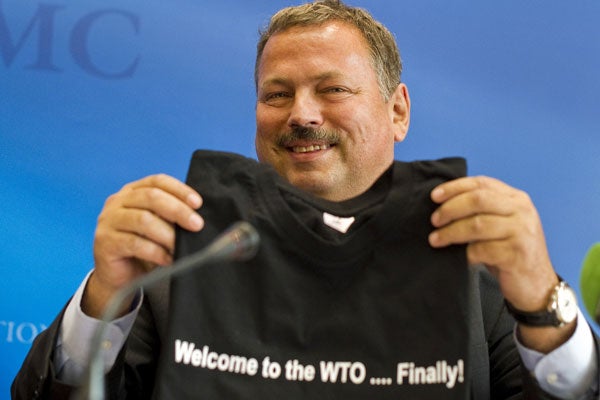 Yesterday, the House Ways and Means Committee approved H.R. 6156, the Russia and Moldova Jackson-Vanik Repeal Act of 2012, by voice vote with only one “nay.” This is a step in the right direction, given that Russia will join the World Trade Organization (WTO) on August 22.
Yesterday, the House Ways and Means Committee approved H.R. 6156, the Russia and Moldova Jackson-Vanik Repeal Act of 2012, by voice vote with only one “nay.” This is a step in the right direction, given that Russia will join the World Trade Organization (WTO) on August 22.
The 1974 Jackson–Vanik amendment denies Russia permanent normal trade relations (PNTR) status—what was historically known the “most-favored-nation status” in trade. Such a determination would violate the WTO rules and put U.S. businesses in Russian markets at a disadvantage to companies from Europe and Asia.
The Jackson–Vanik legislation was an important tool for promoting freedom of emigration and other human rights issues in the Soviet Union and beyond, but in the 21st century, it became antiquated. Today, it is inadequate to address Russia’s multiple human rights problems.
U.S. lawmakers are calling for the Russia and Moldova Jackson–Vanik Repeal Act of 2012 to be accompanied by the bipartisan Sergei Magnitsky Rule of Law Accountability Act, which would deny U.S. visas for, and allow seizure of ill-gotten assets of, officials from Russia and elsewhere who are responsible for gross violations of human rights.
The death of Sergei Magnitsky has come to symbolize the systemic and often violent corruption pervading the Russian state and the failure of its leadership, courts, and law enforcement to fight it. Magnitsky, an attorney and accountant who worked for Hermitage, a major Western equity fund, died in jail awaiting trial on fabricated charges of tax evasion and tax fraud. He was arrested after accusing Russian officials of a sophisticated swindle to obtain a $230 million tax rebate from the Russian treasury. He died after he was denied medical care and severely beaten by guards. Those involved in the crime have not been punished, and some have even been decorated or promoted.
The Obama Administration is not doing enough to address human rights violations in Russia. In the past months, hundreds of people have been arrested and brutally beaten by police SWAT teams in central Moscow, law enforcement has reverted to a Soviet-style extensive searches of opposition leaders’ apartments, fines on organizers of unsanctioned peaceful demonstrations went up 3,000 percent, the government demanded that nongovernmental organizations taking money from foreign donors register as “foreign agents,” libel against officials and judges became a criminal offense, and legislation allowing blacklisting of Internet websites passed the Duma.
Authoritarianism in Russia is growing by leaps and bounds. The Magnitsky bill would set an example by showing that the U.S. does not neglect human rights over commercial interests.
As we have repeatedly written, America should not ignore the weak rule of law in Russia or accept violations of individual and human rights and the spread of corruption and organized crime as a part of President Obama’s “reset policy.”
Trade is good for American jobs, yet Congress should take action against gross and systematic violators of individual rights.






























